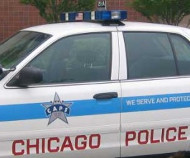12/30/2014
Analysis: Major Racial Disparities In Chicago, Illinois Police Traffic StopsACLU report finds police in Chicago, Illinois target people for driving while black.

By The Expired Meter
A new report from the American Civil Liberties Union of Illinois argues that black drivers are pulled over and searched more frequently by Chicago police than white ones. Minorities in general find themselves targeted for searches more frequently than white drivers.
Based on data obtained from the Illinois Department of Transportation (IDOT), the report reviewed the 100,676 traffic stops made by cops in 2013. Just under half of all drivers stopped were black (46 percent), even though blacks make up only 32 percent of Chicago's total population.
Whites make up an equal 32 percent share of city residents, but white motorists were stopped only 27 percent of the time. Hispanics, at 28 percent of the population, were pulled over 22 percent of the time.
The ACLU report contends racial disparity seems more pronounced in predominately white neighborhoods. In five police districts representing neighborhoods like the Gold Coast, Lincoln Park, Lakeview, River North and Jefferson Park, with a majority of white residents, both blacks and Hispanics were stopped at rates disproportionally higher than their respective populations within those police district boundaries.
For example, the Town Hall district, which covers Lakeview and adjacent northside neighborhoods, is 75 percent white. Blacks were stopped 17 percent of the time despite accounting for a mere 6.6 percent of the population. Hispanics accounted for 15 percent of all stops, even though they are only 10 percent of the overall residential population there.
While these statistics may appear alarming on their face, it is a bit of an apples to oranges comparison. Residential populations are by their nature static, while motor vehicles allow mobility. Motorists travel to other neighborhoods to take kids to school, shop, do business or go out to dinner. Thus, the racial makeup of drivers is constantly changing. Neighborhoods with low numbers of blacks and Hispanics are going to have an over representation of minority motorists based on citywide population figures as blacks and Latinos are the majority, comprising over 60 percent of the total population.
For example, ACLU says blacks are pulled over stopped in predominately white Jefferson Park by a 7.46 ratio based on their population there. This may have more to do with the unique statistical makeup of the area. According to the data, stops of black drivers made up 7 percent of all traffic stops there, which is much higher than the 1 percent of blacks living in the Jefferson Park district. Yet that 7 percent is significantly lower than the 46 percent of black drivers being pulled over citywide.
The traffic stop numbers do seem to show that police search blacks and Hispanics motorists and their vehicles at higher rates than whites. There are four classifications of searches tracked by IDOT -- vehicle by consent, vehicle without consent, driver by consent and driver without consent. In all four categories black and Hispanics were three to five times more likely to be searched by police during a traffic stop.
"In all four kinds of searches analyzed in this report, black and Hispanic motorists were significantly more likely to be searched, and white motorists were significantly more likely than Hispanic motorists to be caught with contraband," says the ACLU report. "In three of four kinds of searches, white motorists were significantly more likely than black motorists to be caught with contraband."
The Illinois Traffic Stop Statistical Study Act was proposed in 2003 by then state senator Barack Obama. However, the law sunsets in 2019. The ACLU is recommending the statute be made permanent. It also advises eliminating consensual searches during routine traffic stops citing the disproportional impact on minority motorists.
A copy of the ACLU's full report, "CPD Traffic Stops and Resulting Searches in 2013," is available in a 200k PDF file at the source link below.
Detailed coverage of Chicago motoring issues can be found at The Expired Meter.


